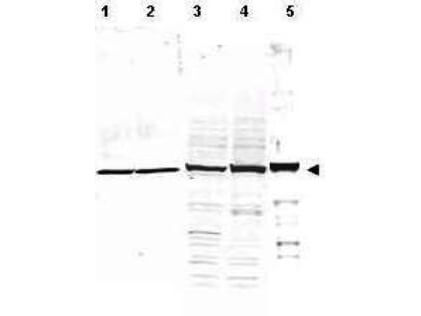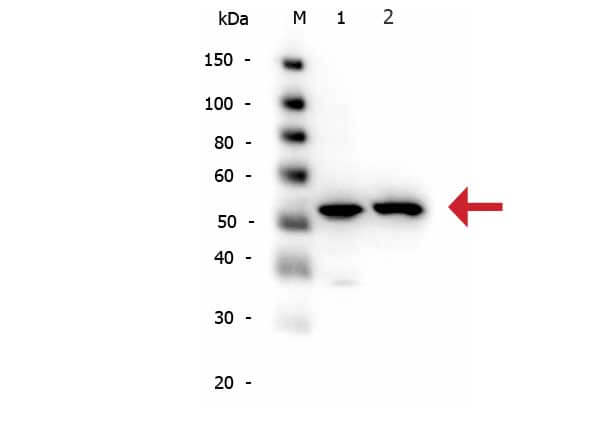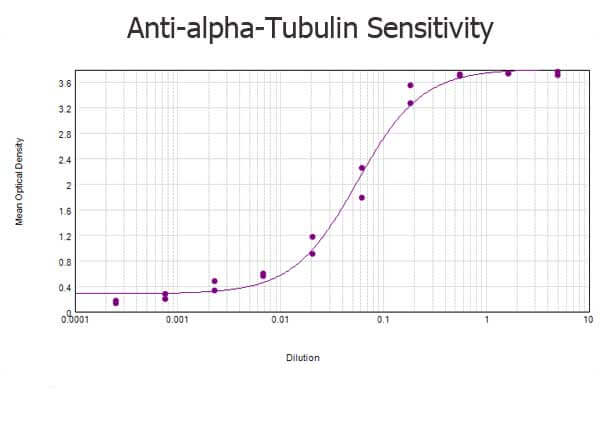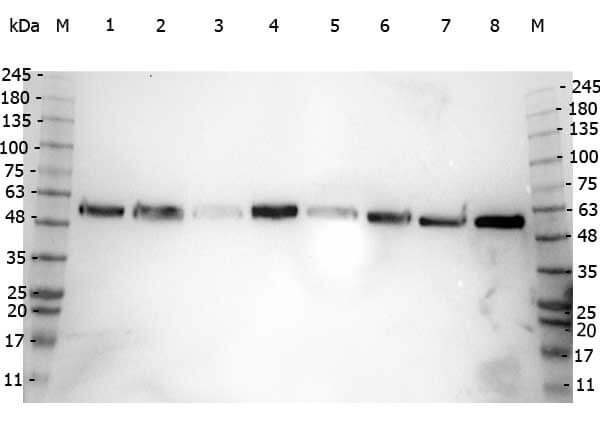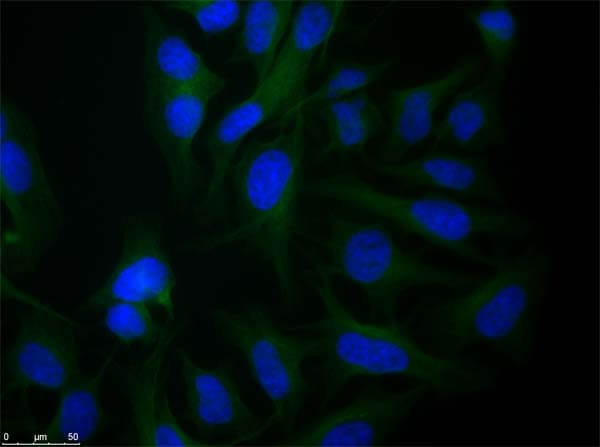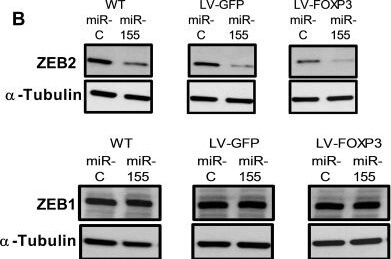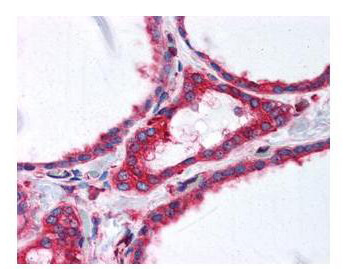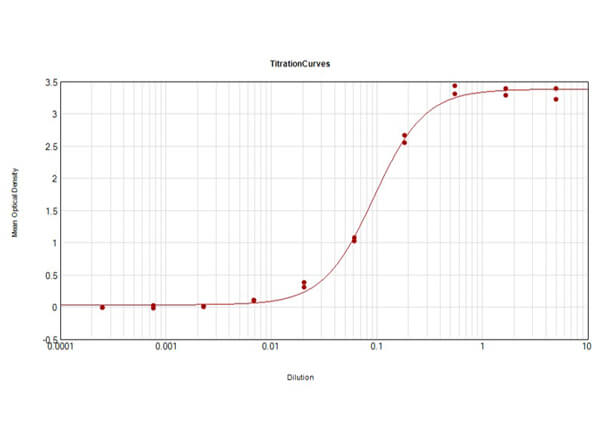Datasheet is currently unavailable. Try again or CONTACT US
Alpha-Tubulin Antibody
Rabbit Polyclonal
37 References
600-401-880S
600-401-880
25 µL
200 µg
Liquid (sterile filtered)
Liquid (sterile filtered)
WB, ELISA, IF, IP, Other
Human, Mouse, Rat
Rabbit
Shipping info:
$50.00 to US & $70.00 to Canada for most products. Final costs are calculated at checkout.
Product Details
Anti-Alpha-Tubulin (RABBIT) Antibody - 600-401-880
rabbit anti-alpha-Tubulin Antibody, rabbit anti-α-tubulin antibody, Tubulin alpha-1B chain, Tubulin alpha-ubiquitous chain, Alpha-tubulin ubiquitous, Tubulin K-alpha-1, TUBA1B, tubulin loading control, Alpha-tubulin, Tubulin alpha-1A, TUBA1A, TUBA3, LIS3
Rabbit
Polyclonal
IgG
Target Details
TUBA1B - View All TUBA1B Products
Human, Mouse, Rat
Conjugated Peptide
Anti-Tubulin Loading Control Antibody was prepared from whole rabbit serum produced by repeated immunizations with a synthetic peptide corresponding to the C-Terminal region near amino acids 425-451 of Human alpha Tubulin.
Anti-Tubulin Loading Control Antibody is directed against human alpha Tubulin protein. The Loading Control Antibody was affinity purified from monospecific antiserum by immunoaffinity purification. A BLAST analysis was used to suggest that this antibody would react with alpha Tubulin from a wide range of organisms, including avian, mammalian aquatic, parasitic and alga sources based on 100% homology for the immunogen sequence. Cross reactivity will occur with all isoforms of alpha tubulin. Such broad reactivity makes this antibody useful as an excellent loading control.
Application Details
ELISA, IF, WB
IP, Other
- View References
Anti-Tubulin Antibody has been tested for use in ELISA, immunofluorescence, and western blot. Specific conditions for reactivity should be optimized by the end user. Expect a band at ~50 kDa in size corresponding to alpha tubulin by western blotting in most cell lysates or extracts.
Formulation
1.1mg/ml by UV absorbance at 280 nm
0.02 M Potassium Phosphate, 0.15 M Sodium Chloride, pH 7.2
0.01% (w/v) Sodium Azide
None
Shipping & Handling
Dry Ice
Store Anti-Tubulin Loading Control Antibody at -20° C prior to opening. Aliquot Loading Control Antibody contents and freeze at -20° C or below for extended storage. Avoid cycles of freezing and thawing. Centrifuge Tubulin Loading Control Antibody if not completely clear after standing at room temperature. This Control Antibody is stable for several weeks at 4° C as an undiluted liquid. Dilute only prior to immediate use.
Expiration date is one (1) year from date of receipt.
Tubulin Loading Control Antibody recognizes microtubules which are involved in a wide variety of cellular activities ranging from mitosis and transport events to cell movement and the maintenance of cell shape. Tubulin itself is a globular protein consisting of two polypeptides (alpha and beta tubulin). Alpha and beta tubulin dimers are assembled to 13 protofilaments that form a microtubule of 22-nm diameter. Tyrosine ligase adds a C-terminal tyrosine to monomeric alpha tubulin. Assembled microtubules can again be detyrosinated by a cytoskeleton-associated carboxypeptidase. Detyrosinated alpha tubulin is referred to as Glu-tubulin. Another post-translational modification of detyrosinated alpha tubulin is C-terminal polyglutamylation, which is characteristic of microtubules in neuronal cells and the mitotic spindle. This antibody makes an excellent loading control. Anti-Alpha-tubulin antibody is ideal for investigators involved in cell cycle protein research.
Becker I et al. (2024). NAAG synthetase deficiency has only low influence on pathogenesis in a Canavan disease mouse model. J Inherit Metab Dis.
Applications
WB, IB, PCA
Hardt R et al. (2023). Proteomic investigation of neural stem cell to oligodendrocyte precursor cell differentiation reveals phosphorylation-dependent Dclk1 processing. Cell Mol Life Sci.
Applications
WB, IB, PCA
Balamurugan K et al. (2023). Stabilization of E-cadherin adhesions by COX-2/GSK3β signaling is a targetable pathway in metastatic breast cancer. JCI Insight.
Applications
WB, IB, PCA
Polák P et al. (2023). Dual agonistic and antagonistic roles of ZC3H18 provide for co-activation of distinct nuclear RNA decay pathways. cell Rep.
Applications
WB, IB, PCA
Gerlach, P et al. (2022). Structure and regulation of the nuclear exosome targeting complex guides RNA substrates to the exosome. Molecular Cell
Applications
WB, IB, PCA
Dillinger, AE et al. (2022). CCN2/CTGF-A Modulator of the Optic Nerve Head Astrocyte. Frontiers in Cell and Developmental Biology
Applications
WB, IB, PCA
Wang-Eckhardt, L et al. (2022). Absence of endogenous carnosine synthesis does not increase protein carbonylation and advanced lipoxidation end products in brain, kidney or muscle. Amino Acids
Applications
WB, IB, PCA
Singh J et al. (2022). Cross-linking of the endolysosomal system reveals potential flotillin structures and cargo. Nat Commun.
Applications
WB, IB, PCA
Garland W et al. (2022). Chromatin modifier HUSH co-operates with RNA decay factor NEXT to restrict transposable element expression. Mol Cell.
Applications
WB, IB, PCA
Klebanovych A et al. (2022). C53 interacting with UFM1-protein ligase 1 regulates microtubule nucleation in response to ER stress. Cells.
Applications
IF, Confocal Microscopy
Xiao H et al. (2021). CRNKL1 is a highly selective regulator of intron-retaining HIV-1 and cellular mRNAs. mBio.
Applications
WB, IB, PCA
Becker I et al. (2021). Mice deficient in the NAAG synthetase II gene Rimkla are impaired in a novel object recognition task. J Neurochem.
Applications
WB, IB, PCA
Grewe B et al. (2021). The HIV 5′ Gag Region Displays a Specific Nucleotide Bias Regulating Viral Splicing and Infectivity. Viruses.
Applications
WB, IB, PCA
Warner BE et al. (2021). Varicella-zoster virus early infection but not complete replication is required for the induction of chronic hypersensitivity in rat models of postherpetic neuralgia. PLoS Pathog.
Applications
WB, IB, PCA
Wang-Eckhardt L et al. (2021). The PGRMC1 Antagonist AG-205 Inhibits Synthesis of Galactosylceramide and Sulfatide. Cells.
Applications
WB, IB, PCA
Sheshadri N et al. (2021). PERK signaling through C/EBPδ contributes to ER stress-induced expression of immunomodulatory and tumor promoting chemokines by cancer cells. Cell Death Dis.
Applications
WB, IB, PCA
Mietzner R et al. (2021). Angiopoietin-1 Mimetic Nanoparticles for Restoring the Function of Endothelial Cells as Potential Therapeutic for Glaucoma. Pharmaceuticals (Basel).
Applications
WB, IB, PCA
Nejedla M et al. (2020). The actin regulator profilin 1 is functionally associated with the mammalian centrosome. Life Sci Alliance.
Applications
IF, Confocal Microscopy
Michie J et al. (2019). Antagonism of IAPs enhances CAR T-cell efficacy. Cancer Immunol Res.
Applications
IF, Confocal Microscopy
Noh BJ et al. (2019). Pathogenetic implications of early growth response 1 in Ewing sarcoma. Pathology.
Applications
WB, IB, PCA
Garland W et al. (2019). A functional link between nuclear RNA decay and transcriptional control mediated by the polycomb repressive complex 2. Cell Rep.
Applications
WB, IB, PCA
Kim et al. (2018). Effect of HIV-1 Tat on the formation of the mitotic spindle by interaction with ribosomal protein S3. Scientific Reports
Applications
IF, Confocal Microscopy; IP, Co-IP; WB, IB, PCA
Brown et al. (2018). FOXP3 and miR-155 cooperate to control the invasive potential of human breast cancer cells by down regulating ZEB2 independently of ZEB1. Oncotarget
Applications
WB, IB, PCA
Lloret-Llinares et al. (2018). The RNA exosome contributes to gene expression regulation during stem cell differentiation. Nucleic Acids Research
Applications
WB, IB, PCA
Ghosh et al. (2017). Little Cigars are More Toxic than Cigarettes and Uniquely Change the Airway Gene and Protein Expression. Scientific Reports
Applications
IF, Confocal Microscopy
Kapadia et al. (2017). Effects of sustained i.c.v. infusion of lupus CSF and autoantibodies on behavioral phenotype and neuronal calcium signaling. Acta Neuropathologica Communications
Applications
Statistical Analysis
Dilworth D et al. (2017). The basic tilted helix bundle domain of the prolyl isomerase FKBP25 is a novel double-stranded RNA binding module. Nucleic Acids Res.
Applications
WB, IB, PCA
Lloret-Llinares et al. (2016). Relationships between PROMPT and gene expression. RNA Biology
Applications
WB, IB, PCA
Liao et al. (2016). Melanopsin-expressing ganglion cells on macaque and human retinas form two morphologically distinct populations. The Journal of Comparative Neurology
Applications
WB, IB, PCA
Li et al. (2015). Nicotinamide ameliorates palmitate-induced ER stress in hepatocytes via cAMP/PKA/CREB pathway-dependent Sirt1 upregulation. Biochimica et Biophysica Acta
Applications
WB, IB, PCA
Besche H et al. (2014). Autoubiquitination of the 26S proteasome on Rpn13 regulates breakdown of ubiquitin conjugates. EMBO J.
Applications
WB, IB, PCA
Gudavicius G et al. (2014). The prolyl isomerase, FKBP25, interacts with RNA-engaged nucleolin and the pre-60S ribosomal subunit. RNA.
Applications
WB, IB, PCA
Balamurugan K et al. (2013). FBXW7α attenuates inflammatory signalling by downregulating C/EBPδ and its target gene Tlr4. Nat Commun.
Applications
WB, IB, PCA
Hawkins ED et al. (2013). Regulation of asymmetric cell division and polarity by Scribble is not required for humoral immunity. Nat Commun.
Applications
IF, Confocal Microscopy
Jakobsen KR et al. (2013). Direct RNA sequencing mediated identification of mRNA localized in protrusions of human MDA-MB-231 metastatic breast cancer cells. J Mol Signal.
Applications
IF, Confocal Microscopy; WB, IB, PCA
Sarkar TR et al. (2012). Identification of a Src tyrosine kinase/SIAH2 E3 ubiquitin ligase pathway that regulates C/EBPδ expression and contributes to transformation of breast tumor cells. Mol Cell Biol.
Applications
WB, IB, PCA
Grewe B et al. (2012). Cytoplasmic utilization of human immunodeficiency virus type 1 genomic RNA is not dependent on a nuclear interaction with gag. J Virol.
Applications
WB, IB, PCA
This product is for research use only and is not intended for therapeutic or diagnostic applications. Please contact a technical service representative for more information. All products of animal origin manufactured by Rockland Immunochemicals are derived from starting materials of North American origin. Collection was performed in United States Department of Agriculture (USDA) inspected facilities and all materials have been inspected and certified to be free of disease and suitable for exportation. All properties listed are typical characteristics and are not specifications. All suggestions and data are offered in good faith but without guarantee as conditions and methods of use of our products are beyond our control. All claims must be made within 30 days following the date of delivery. The prospective user must determine the suitability of our materials before adopting them on a commercial scale. Suggested uses of our products are not recommendations to use our products in violation of any patent or as a license under any patent of Rockland Immunochemicals, Inc. If you require a commercial license to use this material and do not have one, then return this material, unopened to: Rockland Inc., P.O. BOX 5199, Limerick, Pennsylvania, USA.

